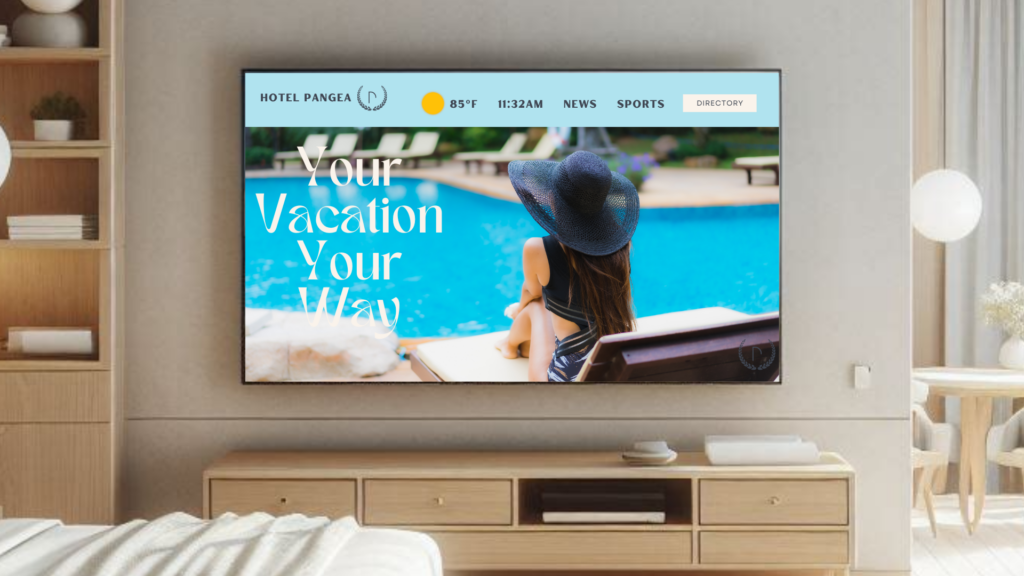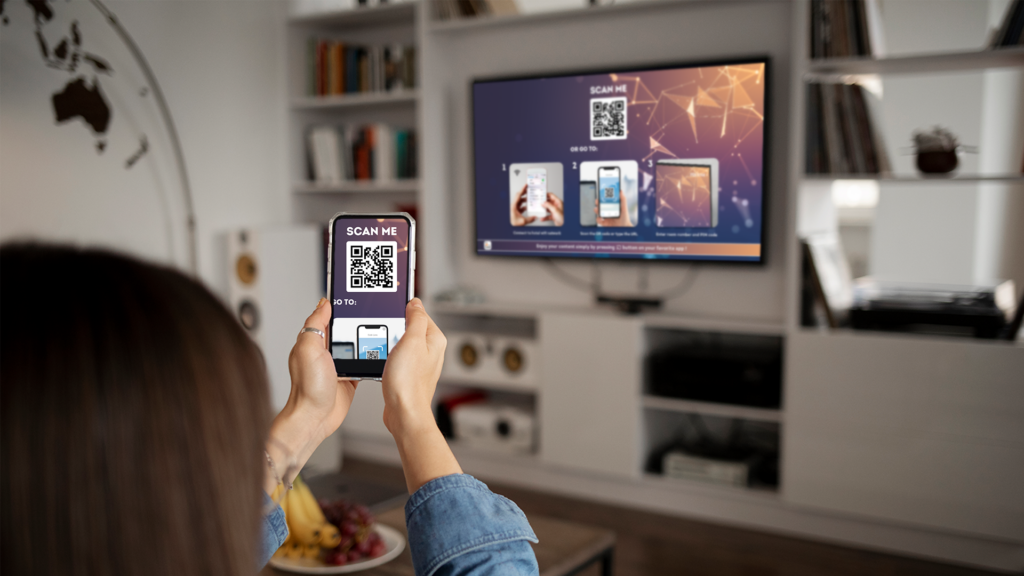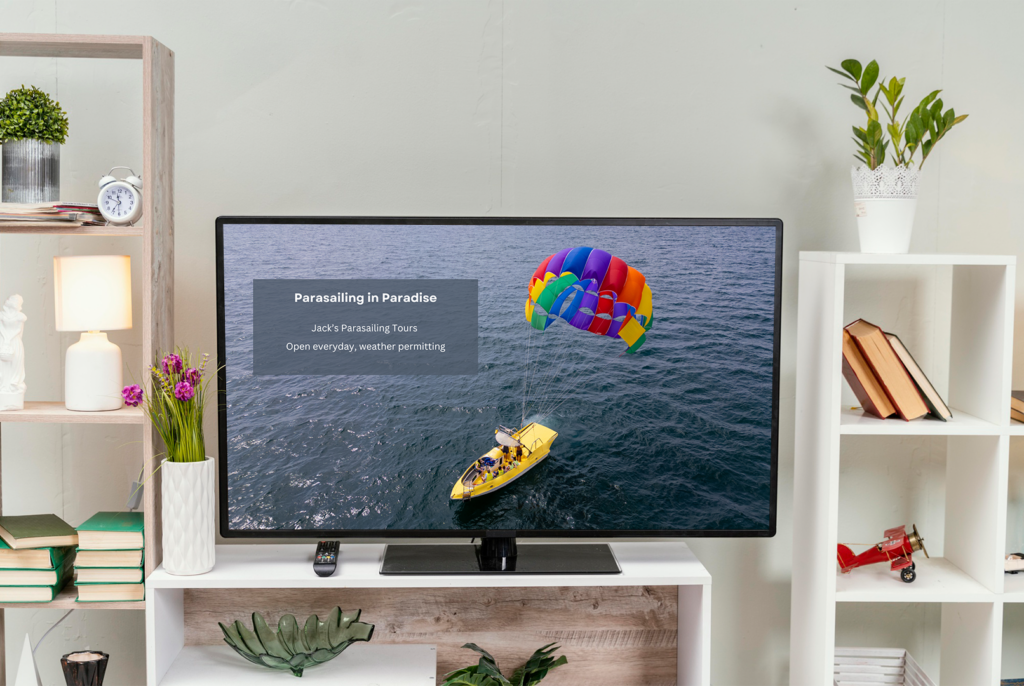Soluzioni TV per hotel: la differenza tra IPTV, casting e TV via cavo

Con tutta la tecnologia moderna disponibile oggi, gli hotel hanno una varietà di opzioni di intrattenimento in camera tra cui scegliere. I proprietari e i gestori di hotel ora devono decidere quale delle molte soluzioni TV per hotel sia la più adatta per i propri ospiti. Possono scegliere tra la TV via cavo, ormai obsoleta e costosa, l’IPTV moderna ma costosa, oppure una soluzione di casting per hotel.
Gli ospiti ora si aspettano esperienze uguali o migliori rispetto a quelle che hanno a casa, inclusi l’accesso ai servizi di streaming, contenuti personalizzati e menu interattivi. Gli albergatori si trovano di fronte a una decisione critica nella scelta tra IPTV, casting e TV via cavo tradizionale, e la scelta giusta può migliorare significativamente la soddisfazione degli ospiti e aumentare l’efficienza operativa a lungo termine.
In questo articolo esploreremo tutte e tre le soluzioni TV per hotel, ne confronteremo i vantaggi e le limitazioni e aiuteremo gli hotel a determinare quale approccio sia più in linea con i loro obiettivi di esperienza per gli ospiti.
Quali sono le diverse soluzioni TV per hotel?
Prima di passare ai confronti, è importante definire cosa intendiamo per soluzioni TV per hotel. Le soluzioni TV per hotel si riferiscono alle tecnologie e ai sistemi utilizzati per fornire contenuti televisivi e multimediali alle camere degli ospiti. In genere, queste soluzioni rientrano in tre categorie principali:
- TV via cavo
- IPTV (Televisione tramite protocollo Internet)
- Casting (streaming degli ospiti o condivisione dello schermo)
Ciascuna di queste opzioni offre il proprio insieme di funzionalità e compromessi. Vediamole nel dettaglio.
TV via cavo tradizionale

La TV via cavo è stata a lungo la soluzione predefinita per gli hotel. Tramite la distribuzione coassiale, gli hotel offrono una gamma di canali in chiaro e premium. La TV via cavo richiede ricevitori o set-top box in ogni stanza, collegati poi al servizio principale dell’hotel.
Vantaggi della TV via cavo negli hotel:
- Affidabile e familiare – La maggior parte degli ospiti sa come usare la TV via cavo e apprezza avere i propri canali preferiti.
- Implementazione a basso costo – Molte strutture più vecchie hanno già l’infrastruttura coassiale installata.
- Nessun bisogno di larghezza di banda Internet – La TV via cavo funziona indipendentemente dalla rete dell’hotel, riducendo il carico sul Wi-Fi.
Limitazioni della TV via cavo negli hotel:
- Personalizzazione limitata – Gli ospiti non possono accedere ai propri account di streaming.
- Contenuto statico – La TV via cavo non offre accesso on-demand né menu interattivi.
- Coinvolgimento ridotto – I viaggiatori più giovani preferiscono sempre più lo streaming e i servizi OTT (over-the-top), facendo sembrare la TV via cavo superata.
- Coinvolgimento ridotto – I viaggiatori più giovani preferiscono sempre più lo streaming e i servizi OTT (over-the-top), facendo sembrare la TV via cavo superata.
Sebbene la TV via cavo abbia ancora un ruolo in alcune strutture, molti hotel stanno passando a soluzioni TV più moderne come IPTV o casting.
IPTV (Televisione tramite protocollo Internet)

L’IPTV fornisce contenuti televisivi e multimediali attraverso la rete IP dell’hotel. Invece dei cavi coassiali, l’IPTV utilizza connessioni Ethernet per distribuire sia i canali in diretta sia i contenuti on-demand tramite un headend centralizzato. La maggior parte delle soluzioni IPTV per hotel consente di integrare servizi come guide di programmi interattive, video on demand (VoD) e portali per gli ospiti con il marchio dell’hotel.
Vantaggi dell’IPTV per gli hotel:
- Esperienza interattiva per l’ospite – L’IPTV consente schermate di benvenuto, promozioni dell’hotel, ordinazioni del servizio in camera e informazioni locali direttamente sulla TV.
- Contenuti on-demand – Gli ospiti possono accedere a film e serie TV in qualsiasi momento.
- Branding e personalizzazione – L’interfaccia utente può essere personalizzata per includere il marchio dell’hotel e persino messaggi personalizzati.
- Gestione centralizzata – Gli aggiornamenti possono essere inviati da remoto a tutte le camere perché tutte le TV sono collegate a un’unica rete IP.
Limitazioni dell’IPTV per gli hotel:
- Maggiori requisiti di larghezza di banda – L’IPTV richiede una rete dati robusta per trasmettere contenuti in ogni camera.
- Investimento iniziale – Le strutture potrebbero dover aggiornare l’infrastruttura esistente a Ethernet, il che può risultare costoso negli edifici più vecchi.
- Blocco del fornitore – Molti sistemi IPTV sono proprietari, il che significa che gli hotel possono essere vincolati a un unico fornitore o piattaforma.
- Costo di abbonamento elevato – A causa dell’elevato livello di interattività e personalizzazione, l’IPTV ha un prezzo significativo, risultando accessibile principalmente per hotel e resort a 4 e 5 stelle.
Nonostante queste sfide, l’IPTV si distingue come una delle soluzioni TV per hotel più potenti perché consente un controllo completo sull’ambiente digitale in camera. L’IPTV è la scelta ideale per resort e hotel di fascia alta.
Soluzioni di casting

Il casting è diventato una delle soluzioni TV per hotel in più rapida crescita perché offre la stessa esperienza che gli ospiti hanno già a casa. Invece di selezionare contenuti forniti dall’hotel, gli ospiti possono trasmettere dai propri abbonamenti “castando” dal dispositivo mobile o dal laptop alla TV in camera. La maggior parte delle soluzioni di casting per hotel utilizza dispositivi compatibili come Google Chromecast o Apple TV, abbinati a sistemi sicuri di autenticazione degli ospiti.
Vantaggi del casting per gli hotel:
- Porta i tuoi contenuti – Gli ospiti utilizzano i propri account Netflix, Hulu, YouTube o altri.
- Esperienza utente semplice – Gli ospiti non devono effettuare l’accesso direttamente sulla TV; basta trasmettere dal proprio dispositivo.
- Costi di licenza dei contenuti più bassi – Gli hotel non devono acquisire licenze VoD o diritti sui contenuti.
- Alta soddisfazione degli ospiti – Gli ospiti ottengono un’esperienza fluida e familiare senza dover imparare una nuova piattaforma.
- Personalizzazione e customizzazione – Gli hotel possono mostrare slideshow e video personalizzati proprio come farebbero con l’IPTV.
Limitazioni del casting per gli hotel:
- Dipendenza dai dispositivi personali – Se l’ospite non ha uno smartphone o account in abbonamento, il casting ha meno valore.
- Richiesta di larghezza di banda – Il casting richiede Wi-Fi ad alta velocità in ogni camera; in caso contrario, la qualità dello streaming ne risentirà.
- Minore interattività – Rispetto all’IPTV, il casting offre meno funzionalità interattive, come l’assenza di servizio in camera, check-out, controllo della temperatura, ecc. tramite le TV degli ospiti.
Il casting brilla nelle strutture con reti wireless robuste e un pubblico esperto di tecnologia. È particolarmente prezioso per hotel boutique, strutture per soggiorni prolungati e marchi che si rivolgono a un pubblico più giovane.
Cosa considerare quando si sceglie tra IPTV, casting e TV via cavo
Poiché le soluzioni TV per hotel variano in funzionalità e investimento, gli hotel dovrebbero valutare attentamente i seguenti fattori:
Criteri | TV via cavo | Trasmissione | IPTV |
|---|---|---|---|
Personalizzazione per l’ospite | Basso | Medio | Alto |
Requisiti di infrastruttura | Basso | Medio | Alto |
Costo di implementazione | Basso | Medio | Alto |
Costo di abbonamento ricorrente | Alto | Basso | Alto |
Promuovere i servizi dell’hotel | Basso | Alto | Alto |
Opzioni di intrattenimento | Basso | Alto | Alto |
Familiarità dell’ospite | Alto | Medio | Basso |
Combinare più soluzioni TV per hotel
Molte strutture moderne stanno ora implementando modelli ibridi. Ad esempio:
- Economico: TV via cavo + Casting – Mantiene i canali live offrendo agli ospiti un’esperienza personalizzata “simile a IPTV” con presentazioni e video personalizzati, oltre all’accesso alle loro app di streaming preferite. Questa opzione soddisfa sia gli ospiti giovani che quelli più anziani, oltre ai proprietari di hotel, grazie alla sua convenienza economica.
- Esperienza completa: IPTV + Casting – Offre contenuti esclusivi con il marchio dell’hotel e funzionalità completamente interattive per gli ospiti tramite IPTV, tra cui servizio in camera, controllo della temperatura, check-out remoto e altro ancora. Inoltre, consente agli ospiti di trasmettere i propri servizi di streaming o di accedere a servizi e canali pay-per-view tramite IP.
Combinando le soluzioni TV per hotel, gli operatori possono soddisfare le diverse preferenze degli ospiti e massimizzare l’utilizzo dell’infrastruttura esistente.
Conclusione: Quale soluzione TV per hotel è quella giusta per te

In definitiva, le migliori soluzioni TV per hotel dipendono dagli obiettivi della struttura, dall’infrastruttura e dalla demografia degli ospiti. La TV via cavo rimane un’opzione conveniente laddove la modernizzazione non sia immediatamente possibile. L’IPTV offre branding approfondito, interattività e nuove opportunità di guadagno. Il casting offre un’esperienza di streaming simile a quella domestica che i viaggiatori di oggi adorano.
Gli operatori del settore dell’ospitalità lungimiranti si concentrano sulla flessibilità, investendo in soluzioni che offrano il meglio di tutti i mondi. Adottando il giusto mix di IPTV, casting e TV via cavo, gli hotel possono migliorare l’esperienza degli ospiti, aumentare la fidelizzazione e rimanere competitivi in un mercato sempre più agguerrito.
